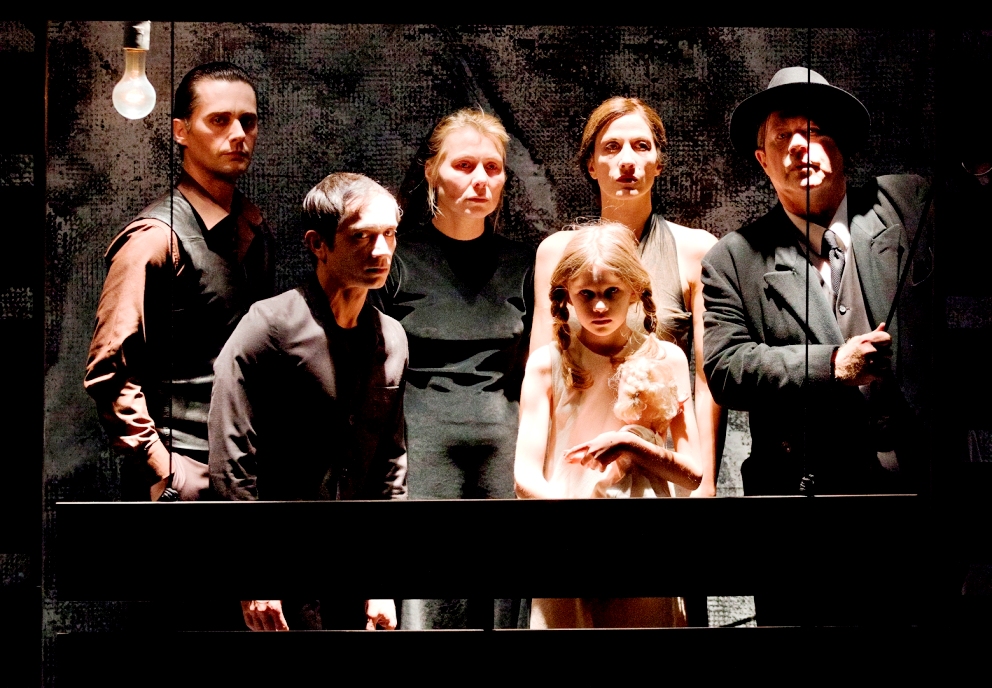"The fantastical should come so close to the real that you must almost believe it," declared Dostoyevsky on Pushkin’s ghostly short story The Queen of Spades. Emmanuel Demarcy-Mota and his superb French ensemble have brought off the feat twice now at the Barbican: two years ago with the pachydermal transformations of Ionesco’s masterpiece Rhinocéros, and now through the intrusion of Pirandello’s nightmare family into a rehearsal of one of his plays.
In a way, it’s a tougher task than the scary metaphor of man-into-beast. Pirandello’s ghostly six (pictured below) become beasts, or at least beastly, themselves from time to time, but in a deliberately confused narrative of wretched relationships (a plot synopsis of their tale is infinitely simpler than the playwright makes it at first). You wonder why they make it so hard both on themselves and for the director along with his company whose task they demand it is to represent their “story”. Pirandello gave a clue in a 1911 Italian newspaper article reproduced in the programme: the Sunday morning audience he holds for “characters in my future short stories” comprises “the most unhappy people in the world, overwhelmed with strange aches and entangled in quite specious situations, people with whom it is really difficult to deal”.
 No question, though, their master of ceremonies is a control-freak force who quite overwhelms the theatre director (Alain Libolt, mask-like and riven with insecurities beneath the tyrannical exterior). Yes, this is a true team, but when the playwright asks for a towering protagonist as the Father, he gets it in the charismatic shape of Hugues Quester, a plausible man-into-rhino in the Ionesco and the kind of old-master actor whose physiognomy and power of eloquent speech compel. You can't take your eyes off him – least of all when he takes up his position at the director's chair and table jutting out from the stage and directly addresses the audience.
No question, though, their master of ceremonies is a control-freak force who quite overwhelms the theatre director (Alain Libolt, mask-like and riven with insecurities beneath the tyrannical exterior). Yes, this is a true team, but when the playwright asks for a towering protagonist as the Father, he gets it in the charismatic shape of Hugues Quester, a plausible man-into-rhino in the Ionesco and the kind of old-master actor whose physiognomy and power of eloquent speech compel. You can't take your eyes off him – least of all when he takes up his position at the director's chair and table jutting out from the stage and directly addresses the audience.
Then – also as before – there’s the infinite variety of Valérie Dashwood, this time a Stepdaughter compelling both physically and vocally who can sing, dance, rage and – most devastatingly of all – laugh the actors to scorn. We believe in the existential pain which mere drama seems powerless to re-enact.
 In the dreamlike pace, the entire ensemble ("actors" and "director" pictured left) never puts a foot wrong, right down to the stage manager and carpenter (Gérald Mallet and Pascal Vuillemot) who manipulate themselves unobtrusively into surreal positions as the action begins to take shape. Which, like everything else, it does with stylish French fluidity, shocking us with the sudden symmetry of roleplay, spellbinding us through to the weird dénouement so that when the “actors” take their bows, the jolt back into the real world is bound to jar.
In the dreamlike pace, the entire ensemble ("actors" and "director" pictured left) never puts a foot wrong, right down to the stage manager and carpenter (Gérald Mallet and Pascal Vuillemot) who manipulate themselves unobtrusively into surreal positions as the action begins to take shape. Which, like everything else, it does with stylish French fluidity, shocking us with the sudden symmetry of roleplay, spellbinding us through to the weird dénouement so that when the “actors” take their bows, the jolt back into the real world is bound to jar.
As in Rhinocéros, the play of light and dark, the unobtrusive movement of props and scenery, in stage and lighting designer Yves Collet’s perfectly modulated stage pictures does as much as the performers to take us to another place, and Jefferson Lembeye’s soundtrack plays an unsettling part too. Its low-level collages set up the spookiness of the Family's appearance and go on to include Messiaen, Satie and a very odd piece of repeating orchestral Verdi (the low clarinets from the prison scene of Il trovatore). No wonder this is the ultimate reality-versus-illusion challenge of the theatre, a play which Richard Jones, who gave us a rather more playful version at the Young Vic some years back, says he wants to do again (a French promoter last night, by the way, worried that we had too many productions of Pirandello to compare this with - not so, of late). We’ll look forward to that; in the meantime, it’s clear that Théâtre de la Ville-Paris has to come back every year, and if they could give us Strindberg’s A Dream Play with the same actors, the ideal fantasy trilogy would be complete.















Add comment